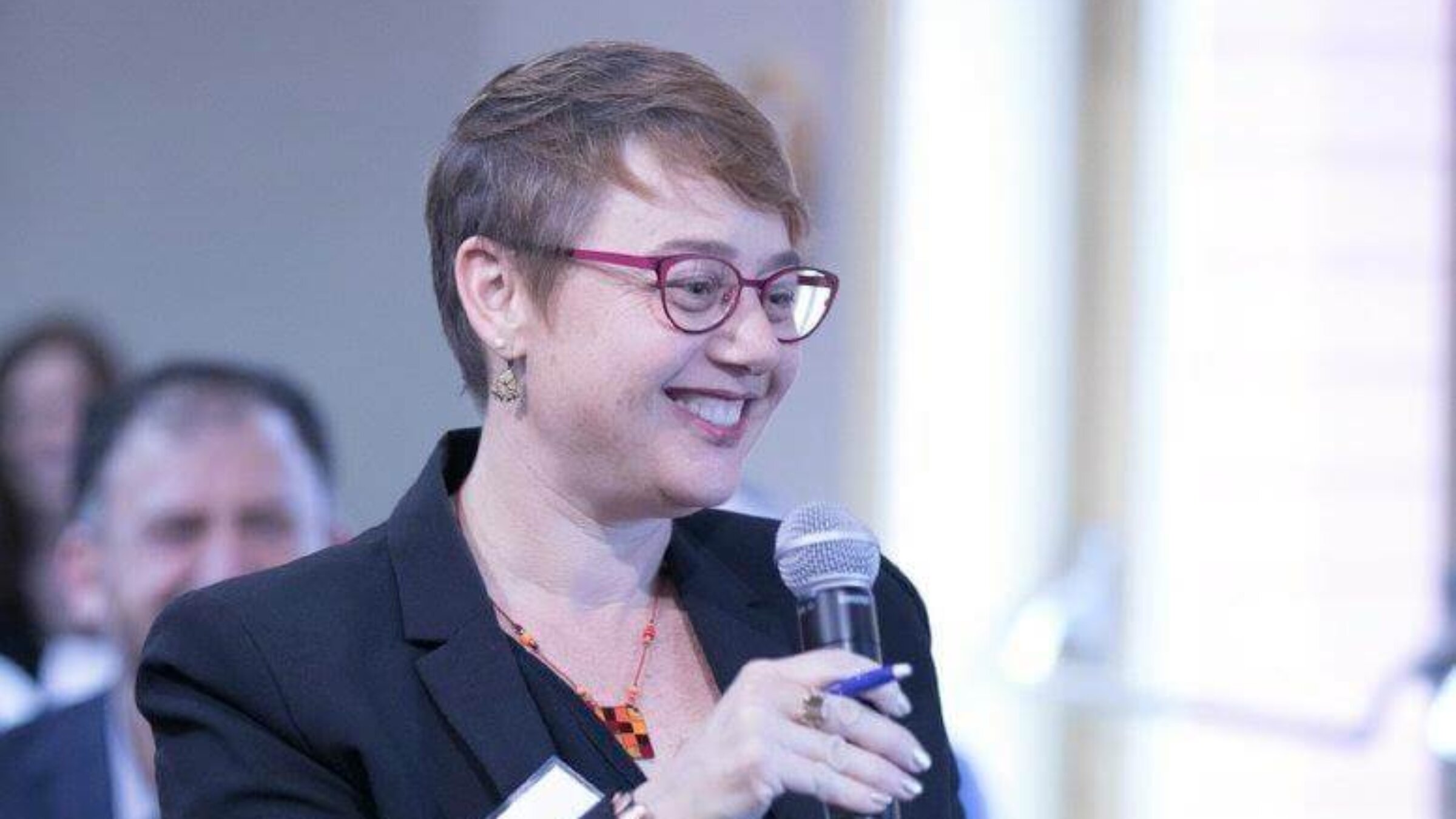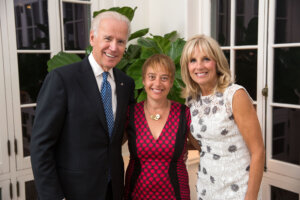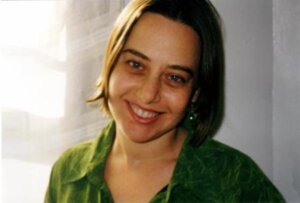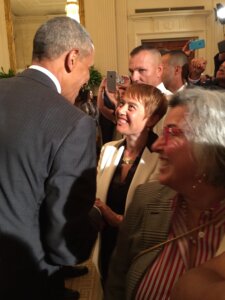She revolutionized the world for LGBTQ Jews, and now she’s ready for a new challenge
After expanding Keshet into a multimillion-dollar juggernaut, Idit Klein is stepping aside

Idit Klein speaking at an event in 2012. Courtesy of Idit Klein
When Alyx Bernstein was in 8th grade and came out to her parents as trans, she told them that despite her deep religious upbringing in synagogue and day school, she felt totally disconnected from Jewish life.
Her path changed completely in 2016 when she attended one youth Shabbaton — a Sabbath retreat — organized by Keshet, an organization whose moniker is: “For LGBTQ Equality in Jewish Life.” For the first time, Alyx felt she had found her Jewish people and her Jewish home.
“I experienced the total 180 of ‘Oh my gosh — actually there is a religious Jewish life which is LGBTQ affirming, inclusive, celebratory, and people can go to an LGBTQ Shabbaton and read Torah and daven together.’ It was the first time I’d been to Saturday morning services in years. I had a tremendous time.”
In addition to Keshet’s Shabbat retreats around the country — with prayer, study, singing, and socializing for Jewish LGBTQ youth — the organization lobbies Congress and the courts on behalf of LGBTQ rights, conducts training sessions for clergy and lay leaders working in synagogues, day schools, Jewish summer camps and Hillels. Keshet has often been the proverbial hotline for Jewish institutions navigating unfamiliar territory, and offers concrete suggestions for how to make LGBTQ Jews feel not just accepted, but integral.

Today this organization is at a key inflection point, thanks to the imminent retirement of its president and CEO, Idit Klein — the straight-talking, wide-smiling, energetic leader who says she feels ready to pass the baton, as she weighs other opportunities in justice work, possibly related to Israel.
“There’s a Jewish concept, kol d’mama daka, the ‘still small voice,’” Klein told me over Zoom. “Very profoundly, a still small voice was telling me, ‘It’s time for your next chapter.’ There really was no thinking or analysis beyond that.”
As Klein prepares to step aside on July 31, I asked her to reflect back on the organization she built and where its hurdles remain.
“Nowadays most of the Jewish communities we work with start out in a place of tolerance, and sometimes are very happy about that,” she said. “But they need to be reminded that no one wants to be ‘tolerated’ in their home. The crux of our work has always been about revealing to the broader Jewish community the extent to which LGBTQ Jews have felt — and many continue to feel — a sense of exclusion and alienation and isolation in their Jewish communities, including in liberal Jewish communities.”
Klein has seen, especially during the two Trump administrations, some synagogue leadership advising staff to take down the Keshet “safe space” stickers or not to include pronouns on name tags or Zoom identifiers because, some contend, “it can be polarizing.” But despite instances of what she considers backsliding, Klein is focused on how far Jewish institutions have come — hiring openly gay clergy, adding LGBTQ-focused programming and advocacy, participating in Pride Month, rethinking terminology in sermons, newsletters, and social media statements.
Keshet was the brainchild of two Jewish men, Jonathan Krasner and Jared Goldfarb, who co-founded it as an all-volunteer grassroots group in 1996, then handed it over to Klein in 2001. She built an initial budget of $42,000 – more than half given by Combined Jewish Philanthropies in Boston — which has now grown to $6.4 million and a team of 35, based in six city hubs: New York, Boston, Miami, Chicago, Texas and San Francisco.
“Saying LGBTQ people have a place in a rabbi’s responsibility was revolutionary,” said Rabbi Menachem Creditor, Scholar-in-Residence at UJA Federation of New York. “I had been ordained a year before Idit started at Keshet and had not thought of myself as responsible for this conversation.”

“We did a workshop with Keshet,” recalled David Rittberg, who met Klein in 2011 when he was executive director of NYU HIllel. “I remember thinking, ‘I’m an inclusive guy, it’s an inclusive organization, we have our act together on this.’ And then, of course, I learned throughout the process that we weren’t as good as we thought.”’
Rittberg, now Senior Director at Schusterman Family Philanthropies, which has been funding Keshet for 20 years, said Keshet remains as necessary as ever. “I think this work is never done. It just requires constant care, openness and training,” he said.
New York Judge Seth Marnin, who served on Keshet’s board of directors and recently became the first openly transgender male judge in the United States, met Idit Klein back in 2013 when he was working on marriage equality cases for the ADL and Keshet actively supported their amicus briefs. “She’s courageous,” Marnin said of Klein. “It’s challenging to talk to people who do not believe in your humanity”
A Yale graduate, Klein received a Master’s in Education from the University of Massachusetts Amherst with a concentration on social justice and anti-oppression education. A grandchild of four Holocaust survivors, Klein told me she still carries an intense childhood awareness of how her family persevered. Their story seeded her belief in defiant optimism. In a 2020 essay for this publication, Klein recounted what a friend told her about her positivity: “‘It’s like you see a glass with a single drop in it and somehow you immediately are able to imagine that glass entirely full.”
That sanguinity has clearly steered Klein’s approach to post-Oct. 7 strains within the LGBTQ and Jewish community. Many gay, lesbian and trans Jews have felt exiled from LGBTQ meetings, social gatherings, organizations, and even protests and parades — because they’re expected to check their Zionism at the door.
“LGBTQ Jews feel shunned by the Jewish community and the LGBTQ community right now,” Klein acknowledged. “I understand the pain and sense of betrayal and I certainly experienced that personally. There were quite a few LGBTQ organizations that put out statements after October 7 that we found challenging.” She declined to name the one that was especially difficult, because she ended up having a fruitful discussion with its chief.

“We met for over three hours, and she asked me questions about Jewish history that led me to say, ‘I need to start in 586 BCE. I did my best to provide 2,500 years of Jewish history,’ Klein recalled. “And our conversation was possible because there was a relationship — trust — already there, so she was open to hearing my perspective. That led to her making a commitment, at the end of the conversation, that they would not use the language that we identified as problematic again.”
I asked Klein about the confusion many non-LGBTQ Jews have expressed as they witness members of the gay/trans community support Hamas, which is ruthlessly and violently intolerant of homosexuality.
“I can understand that response,” Klein said. “But what I know to be true is that most of the people I know, who are marching with a critique of Israeli government policy, calling for the war to end, calling for the liberation of Palestine, are doing so from a deeply humanitarian place of seeing people who are suffering and wanting to speak up as Jews in response to that. I haven’t done a lot of talking with the people who are walking around with red triangles or other Hamas imagery.”
I told Klein her comments suggest a bottomless patience. “I wouldn’t say bottomless,” Klein corrected me with a smile. “It is painful, and there are moments when I’m stopped in my tracks. But I just can’t stay there. I can’t surrender to believing that this person is lost and will forever be my enemy. It’s just not how I’m oriented.”
It’s this outlook that makes her certain Keshet will not falter without her now, despite the current headwinds of anti-LGBTQ policies and legislation. “I couldn’t have more confidence in the person taking my place,” she said of Jaimie Krass, Keshet’s Director of Youth Programs, who was the unanimous pick – announced last Friday — of Keshet’s search committee, which included Alyx Bernstein.
“So many people who I am still in touch with from the Shabbotonim are in the Jewish professional world now,” Bernstein, now 24, said. “They’re working in federations, Keshet, education, and the Rabbinate.” She herself got dual degrees from Barnard College and the Jewish Theological Seminary, and is entering Hebrew College rabbinical school this fall.
“I was always encouraged by Idit, by Keshet to be myself, to tell my story. It totally transformed me. I don’t think that ever would have happened if, when I was 15 years old, I hadn’t gone to that Shabbaton.”

















